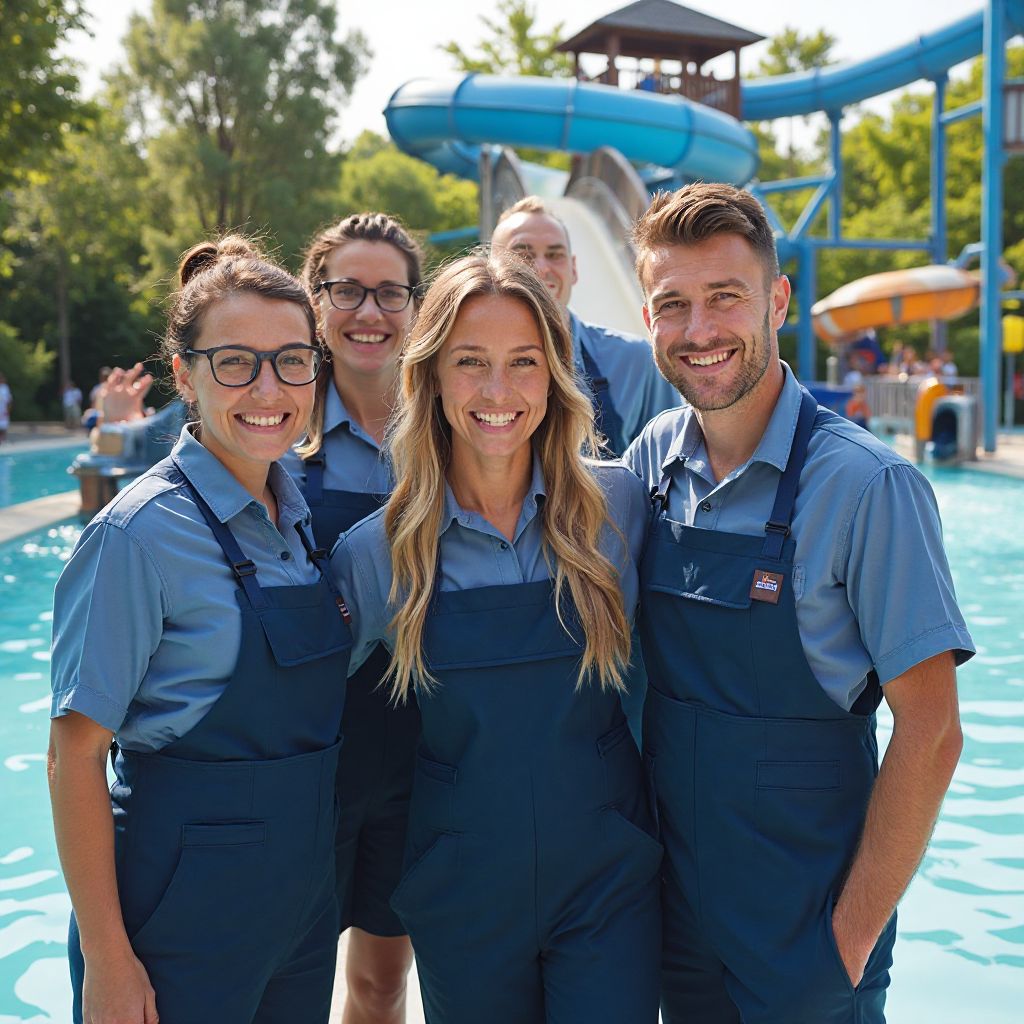Our Mission
At AquaFun, our mission is to create unforgettable water experiences that bring joy, excitement, and rejuvenation to people of all ages. We believe that water attractions should be more than just entertainment – they should be transformative experiences that connect people with the element of water in safe, innovative, and exhilarating ways. Our dedication to excellence drives us to constantly improve and expand our offerings, ensuring that every visit to AquaFun creates lasting memories for families, friends, and individuals alike.
We're committed to environmental sustainability, using water-saving technologies and eco-friendly practices throughout our parks. By combining cutting-edge attraction design with a deep respect for water as a precious resource, we create spaces that are not only fun but also mindful of our environmental footprint. Our team of experienced professionals works tirelessly to maintain the highest standards of safety, cleanliness, and customer service, making AquaFun the premier destination for water entertainment worldwide.

Our Vision

Our vision at AquaFun is to redefine water entertainment globally, pioneering experiences that blend adventure, relaxation, and education in harmonious balance. We envision our parks as innovative hubs where cutting-edge technology meets the timeless joy of water play, creating attractions that surprise and delight visitors while maintaining the highest standards of safety and environmental stewardship.
Looking to the future, we aim to expand our presence worldwide, bringing the AquaFun experience to new locations while adapting to local cultures and environments. We envision water parks that not only offer thrilling rides and relaxing pools but also serve as educational centers where visitors can learn about water conservation, marine ecosystems, and the importance of protecting our planet's most precious resource. Through continuous innovation and a commitment to excellence, AquaFun will remain at the forefront of the water entertainment industry, setting new standards for what water parks can achieve.
Our Exciting Attractions

Tornado Twister
Experience the ultimate adrenaline rush on our signature Tornado Twister slide. This heart-pumping adventure begins 120 feet above ground, where riders climb aboard a four-person raft before plunging into a massive funnel at speeds reaching 35 mph. The centrifugal force propels you up the sides of the funnel, creating moments of weightlessness before swooshing you into the splash pool below. With its unique design and thrilling sensations, the Tornado Twister has become our most photographed attraction and a must-try experience for thrill-seekers of all ages.

Paradise Stream
Float away your cares on our quarter-mile Paradise Stream, a gentle lazy river that winds through lush tropical landscapes, cool grottos, and beneath refreshing waterfalls. Grab one of our comfortable single or double tubes and let the current carry you along as you soak up the sun or cool off in the shaded passages. The Paradise Stream maintains a perfect 82-degree temperature year-round, making it an ideal retreat for relaxation between more adventurous attractions. Families particularly love this attraction for its gentle pace and beautiful surroundings.

Tsunami Bay
Tsunami Bay brings the ocean experience inland with our massive 30,000-square-foot wave pool. Advanced wave-generating technology creates eight different wave patterns, from gentle rolling swells perfect for younger guests to challenging five-foot waves that delight surfers and strong swimmers. The graduated entry makes this attraction accessible for everyone, while our team of attentive lifeguards ensures safety at all times. When the tsunami horn sounds every hour, prepare for our signature "mega wave" that never fails to elicit cheers from the entire pool!

Splash Island
Designed specifically for our younger guests, Splash Island is an interactive water playground featuring over 50 water play elements including small slides, spray jets, dumping buckets, and water cannons. The centerpiece is our giant tipping bucket that fills and dumps 500 gallons of water every five minutes to the delight of everyone below. With a maximum depth of just 18 inches, parents can relax knowing their little ones can play safely while developing water confidence and having a blast in their own special aquatic world.

Velocity Racers
Challenge your friends and family to the ultimate showdown on Velocity Racers, our six-lane high-speed racing slides. Competitors climb to the 60-foot platform, grab their mats, and take position at the starting line. When the light turns green, it's a heart-pounding dash to the finish as racers zoom head-first down the parallel flumes. Our electronic timing system displays everyone's times at the finish line, sparking friendly competition that often leads to multiple races back-to-back as guests try to improve their times and claim sliding supremacy.

Serenity Springs
Serenity Springs offers an adults-only retreat where guests 18 and older can escape to tranquility. This premium area features heated hydrotherapy pools with massaging jets, in-water loungers, and a swim-up refreshment bar serving tropical drinks and light fare. The surrounding landscape is designed with privacy in mind, incorporating lush greenery, comfortable cabanas, and ambient music to create a spa-like atmosphere. Serenity Springs is the perfect place to recharge your batteries or enjoy a romantic respite during your day at AquaFun.
Workshops & Activities
At AquaFun, we believe learning can be as exciting as playing. Our educational workshops combine fun with valuable skills and knowledge about water safety, environmental conservation, and aquatic ecosystems.

Swim Academy
Our certified instructors offer swimming lessons for all ages and skill levels, from toddlers getting comfortable in the water to adults refining their technique. Classes are held in our dedicated instruction pool before park opening hours, ensuring personalized attention in a distraction-free environment. The Swim Academy follows a progressive curriculum that builds confidence and competence in the water through fun, structured activities tailored to each participant's abilities.
Register Now
Marine Explorers
This fascinating educational program introduces participants to the wonders of marine ecosystems through interactive exhibits, touch pools, and engaging presentations. Led by our marine biologists, Marine Explorers sessions cover topics like ocean conservation, coral reef ecology, and the importance of water preservation. Kids receive an explorer's kit complete with identification guides and activity sheets that make learning a hands-on adventure. Perfect for school groups or as an enriching addition to family visits.
Learn More
Safety First
Our popular Safety First workshops equip participants with essential water safety skills and knowledge that could save lives. Sessions cover rescue techniques, CPR basics, recognizing signs of drowning, and proper supervision practices for different aquatic environments. Our experienced lifeguard team conducts these informative workshops using demonstrations, role-playing scenarios, and hands-on practice with rescue equipment. Families particularly value these sessions before vacation seasons when swimming activities increase.
Sign UpInnovative Technology

At AquaFun, we're at the forefront of water park technology, implementing state-of-the-art systems that enhance guest experiences while prioritizing safety and sustainability. Our proprietary water purification system exceeds industry standards, using advanced UV treatment, ozonation, and intelligent chemical monitoring to maintain perfect water quality with minimal chemical usage. This results in crystal clear water that's gentle on skin, eyes, and swimwear while being environmentally responsible.
We've also pioneered smart queue management technology through our park app, allowing guests to reserve spots on popular attractions and receive notifications when it's their turn to ride. This virtual queuing system dramatically reduces wait times and improves flow throughout the park. Additionally, our water conservation initiatives include rainwater harvesting, advanced recirculation systems, and low-flow fixtures that collectively reduce our water usage by 40% compared to traditional water parks of similar size.
Our latest innovation is the RFID wristband system that serves as your digital wallet, locker key, and photo pass throughout the park. These waterproof wristbands eliminate the need to carry cash or keys, allowing for a worry-free experience. Parents particularly appreciate the family tracking feature that allows them to locate members of their group anywhere in the park with a simple tap on their smartphone.
Awards & Recognition
Our commitment to excellence has been recognized by industry leaders and organizations worldwide. We're proud of the accolades that reflect our dedication to creating exceptional water experiences.

World's Best Water Park
Named "World's Best Water Park" three years running by International Leisure Association, recognizing our exceptional attraction design, guest satisfaction, and operational excellence. This prestigious award evaluates water parks worldwide on over 100 criteria including safety records, innovation, and environmental practices.

Safety Excellence Award
Recipient of the Gold Safety Standard certification from the Global Aquatic Safety Council for our comprehensive safety protocols, staff training programs, and perfect safety record. Our lifeguard team is recognized as among the best trained in the industry, with response times exceeding international standards.

Green Innovation Award
Honored with the Environmental Stewardship Award from the Sustainable Tourism Council for our water conservation initiatives, energy-efficient operations, and eco-friendly facility design. Our solar-powered water heating system and rainwater collection infrastructure have become industry benchmarks for sustainable water park operations.
Water Safety Resources
We've partnered with leading organizations to provide valuable water safety information and resources for our visitors. These trusted partners share our commitment to making water activities safe and enjoyable for everyone.
National Water Safety Council
Comprehensive guidance on water safety practices and drowning prevention.
Visit WebsiteSwim Safe Foundation
Educational resources for teaching children water confidence and swimming skills.
Learn MoreGlobal Aquatic Conservation
Information about water conservation and protecting aquatic ecosystems.
Explore ResourcesWater Park Industry Association
Standards and best practices for water park operations and guest experiences.
Visit WebsiteBehind The Scenes

Ever wondered what happens at AquaFun before the gates open and after they close? Our dedicated team of over 200 professionals works around the clock to ensure everything runs perfectly for our guests. Each night after closing, our maintenance technicians inspect every inch of each attraction, meticulously checking mechanical components, water quality, and safety features. Meanwhile, our cleaning crews deploy state-of-the-art equipment to sanitize all surfaces according to our rigorous hygiene protocols.
Our water quality lab operates 24/7, conducting over 100 water tests per day across different attractions to maintain perfect pH levels, clarity, and sanitation. The engineering team arrives at 5:00 AM to power up the park's systems, calibrate water flows, and test all slides before the lifeguard team conducts their morning safety drills. It takes precise coordination among departments to transform the quiet nighttime facility into the vibrant, energetic water wonderland that welcomes thousands of guests daily.
Join Our Team

Looking for a career that makes a splash? Join the AquaFun team and be part of creating unforgettable experiences for our guests. We're always seeking enthusiastic individuals who share our passion for water entertainment, safety, and exceptional customer service. Working at AquaFun means joining a diverse community of professionals dedicated to bringing joy to thousands of visitors every day.
We offer positions across numerous departments including lifeguarding, guest services, food and beverage, maintenance, entertainment, and administration. Seasonal and year-round opportunities are available with competitive compensation, flexible scheduling, and excellent benefits for full-time team members. We provide comprehensive training programs that equip you with valuable skills that will serve you throughout your career, whether you're a first-time job seeker or an experienced professional.
View Open PositionsContact Us
Get In Touch
Have questions or need more information? We're here to help! Fill out the form or use our contact details below to reach our customer service team.
Phone: (555) 123-4567
Email: [email protected]
Address: 123 Splash Avenue, Watertown, FL 33001
Hours: 10:00 AM - 7:00 PM, Daily (May-September)
Weekends only in April and October